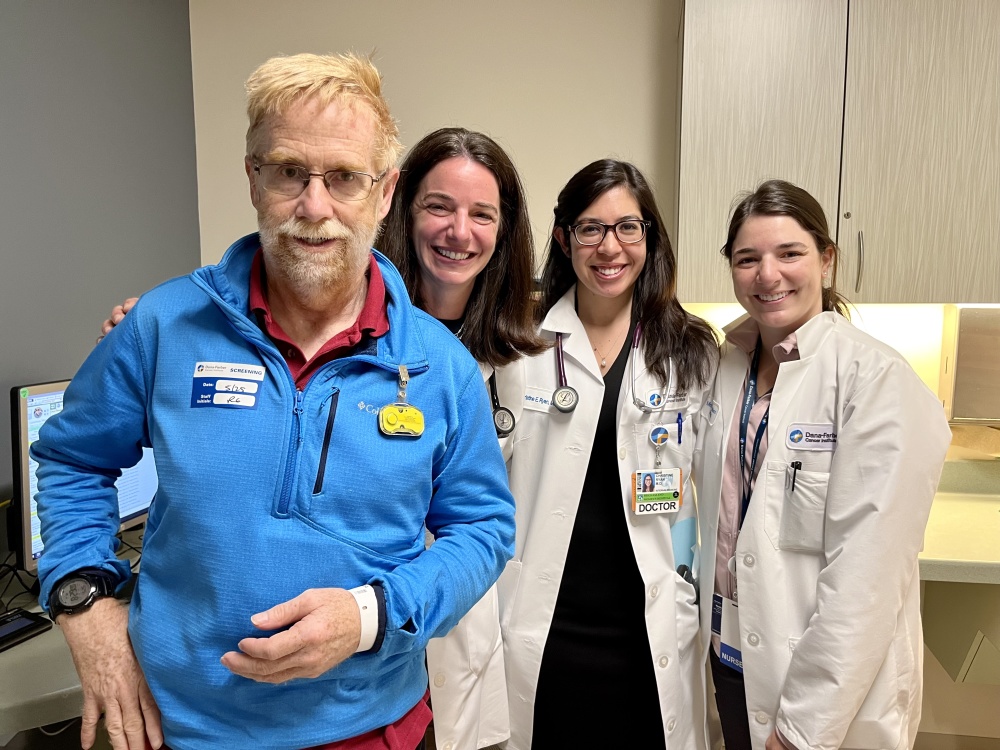After nearly nine years of living with follicular lymphoma, a type of non-Hodgkin lymphoma (NHL), it took just a few minutes for things to change dramatically for Marc Cummings this spring.
That was all the time needed to transfer the small bag of modified CAR T-cells — which had been recrafted from Cummings’ own T cells, removed a month earlier — back into his bloodstream. One month after the April 24 transfusion, he had a clean PET Scan and was declared cancer-free.
“Too good to be true,” Cummings, 57, said the day he got the news. His mother, Karen, nodded in agreement, then added with a smile: “Yes, and we hope it stays that way.”
Based on the experience of other patients, the chances are good. Since being introduced in clinical trials more than a decade ago as an option for individuals with NHL and other recurrent lymphomas that are unresponsive to other treatments, the CAR T-cell therapy process has proven extremely effective.
The procedure involves altering a patient’s T cells, whose immune system role of recognizing and attacking cancer cells can be thwarted by malignant tumors that disguise themselves to evade detection. T cells are removed in a process similar to a blood donation, genetically engineered in a laboratory to sprout special structures known as chimeric antigen receptors (or CARs) on their surface, and then put back into the patient’s bloodstream.
CAR T-cells prove much more successful in their seek-and-destroy mission than their T cell predecessors, attaching themselves to specific molecules (or antigens) found on the surface of cancer cells. As a result, about half of the first lymphoma patients who underwent CAR T-cell therapy as part of clinical trials 10 years ago have remained cancer-free ever since. Cummings’ care team in the Lymphoma Program at Dana-Farber Brigham Cancer Center is confident he can join their ranks.
“We have a three-year follow-up from one of the pivotal clinical trials in follicular lymphoma, and over half of the patients remain in remission at this time point,” says Caron Jacobson, MD, MMSc, Cummings’ oncologist and medical director of Dana-Farber Brigham’s Immune Effector Cell Therapy Program. “The median time to best response for CAR T-cell therapy in follicular lymphoma is one month, and the vast majority of patients will respond and remit at this time point. So while I am not surprised that Marc is in remission so quickly, I am relieved and happy for him.”

Dual challenges
Cancer was not the first serious health care challenge Cummings faced. In 1987, his senior year in college, he suffered a traumatic brain injury in a car crash that left him with slight physical and permanent mental impairments — including a total loss of his short-term memory. He has worked with specialists and his family ever since to maintain a strong quality of life, and is known for his warm disposition and quick wit by his many friends in the Mount Washington Valley region of New Hampshire, near his longtime home just across the border in tiny Fryeburg, Maine.
In late 2014, Cummings visited his primary care physician when he began losing weight unexpectedly. The doctor also noticed swelling and bumps in his abdomen area, and, knowing that both are symptoms of non-Hodgkin lymphoma, ordered a biopsy. Shortly thereafter, Cummings’ follicular lymphoma was confirmed.
He was referred to a Maine hospital close to his home for treatment, but since his mother and primary caregiver, Karen Cummings, had worked for 12 years as a communications specialist at Dana-Farber, she insisted they go there for a second opinion. This was when they first met Jacobson, who concurred with the treatment plan designed for Marc in Maine.
“Follicular lymphoma is the second most common lymphoma diagnosed in the U.S., and the first-line treatment is well established and standardized, so there was no reason to travel between states for Marc to receive it,” explains Jacobson. “We had a choice between IV chemotherapy and an oral anti-lymphoma therapy, and because of Marc’s memory issues we thought an oral therapy would be better tolerated overall. So he started this under the supervision of his local oncologist in Maine.”
During the next eight-plus years, Cummings was on two separate courses of treatment. He suffered no side effects, and was able to continue his active outdoor lifestyle including hiking and a job bundling and selling wood. While his lymphoma responded to therapy, it never went into remission, and with time would start to grow and progress again. It was during this period, in 2021, that CAR T-cell therapy was approved by the Food and Drug Administration (FDA) for treatment of follicular lymphoma patients, following an earlier FDA approval in 2017 for large B-cell lymphoma — a different subtype of B-cell NHL.
“This January, his oncologist in Maine noticed his cancer was growing again, and recommended we try CAR T at one of the Boston hospitals,” says Karen Cummings. “I read up on it, saw that Dana-Farber Brigham was a leader in the field, and was excited to see that their first NHL patients to get CAR T-cell therapy were still cancer-free. So we went down and met again with Dr. Jacobson.”
Once again, Jacobson agreed with Marc’s Maine oncologist: he was a good candidate for CAR T.
“Marc is young and otherwise healthy, so he could withstand the side effects of CAR T-cell therapy,” says Jacobson. “On top of this, Marc’s follicular lymphoma proved to be higher risk than we initially thought, given that it progressed quickly through two lines of treatment. So an option like CAR T-cell therapy, which has the highest complete response rate and longest response duration of any available therapy for patients needing third-line treatment, was a good option.”

Home free
Because CAR T-cell patients are regularly monitored and examined, they must stay within two hours of Dana-Farber Brigham’s Longwood Medical Area campus for much of the process. Marc and Karen temporarily relocated from Maine to Massachusetts, and on March 24 arrived at the Kraft Family Blood Donor Center at Dana-Farber Brigham for the collection of Marc’s T cells.
During the weeks that followed, including the three days of intensive chemotherapy that preceded Marc’s CAR T infusion and his week as an inpatient at Brigham and Women’s Hospital after it, Karen was impressed by the warmth and professionalism of Jacobson and the entire Dana-Farber Brigham team.
“They were so understanding and sensitive to Marc’s memory challenges, and he had a great time telling them jokes,” she recalls.
In terms of side effects, Jacobson says the biggest challenge for the care team was monitoring Marc for any neurologic changes brought on by the CAR T-cell treatment. Although they usually test patients by incrementally asking them questions that include what date and year it is, and where they are, Marc has trouble with such questions due to his short-term memory deficits. They worked around this by asking him for the day, month, and time, and letting him look at his watch to respond, or by asking him where his mother once worked in order to answer questions about where he was. If Marc ever forgot to look at his watch, or that Dana-Farber was where his mom Karen worked for many years, they would realize he was confused from baseline. It never happened.
“Karen is Marc’s biggest advocate, and makes sure to tell everyone about topics and words we should avoid in caring for him, which is extraordinarily helpful,” says Jacobson. “The nurses and clinical staff were all oriented to these things before they met Marc and started to care for him.”
Now mother and son are back home in Maine, where Marc is once again greeting people around town, going on hikes, and delivering his wood to customers. And while Jacobson says it is unclear whether his follicular lymphoma will come back, she is confident his remission will last for several years. For now, he’ll have checkups each three months — alternating between Maine and Dana-Farber Brigham.
Jacobson is looking forward to Marc’s next visit, hoping he’ll have some good jokes ready for her.

I love reading about the success of CAR T.
I had CAR T therapy at Dana Faber in January and I’m doing great! Thank you Dana Faber.
So happy to read about Marc’s remarkable results with Car/T treatment. I too after dealing with Multiple Myeloma for 10 years, never able to achieve complete remission, had the opportunity to receive Car-T. at Dana-Farber Brigham. I too within minutes became cancer-free. My hope is that this treatment will be soon available to change the lives for many other cancer patients. Good luck Marc. Enjoy each new day! ☀️
Terrific story. I have NHL and am relieved after reading this story
Wonderful
Hope melanoma finds its’ place under this treatment
This is wonderful news. Congratulations to all. Dana Farber is the place to go for cancer treatment. I go there myself.
Great story! Car-T is a lifesaver. I am now 5 years in remission for a Follicular Lymphoma through a clinical trial at Dana Farber. Dr Jacobson and the team of Dr.s and Nurses from Brigham and Woman’s Hospital also saved me. Very Grateful. Congratulations to Marc and welcome to the club!